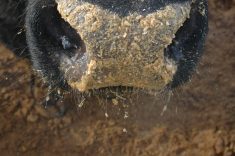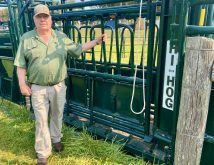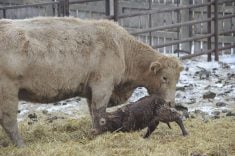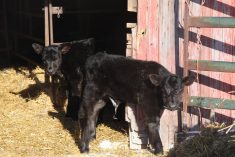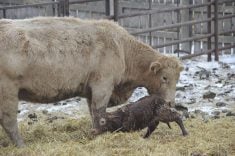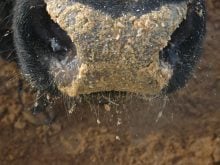Suckling is the best way for calves to consume colostrum because it goes directly from the esophagus to the true stomach
Getting calves off to a good start in life begins with that first drink of colostrum.
Colostrum contains essential immunoglobulins to build immunity against calf-hood diseases. Imunoglobulins are antibodies that pass on immunity to the babies in the colostrum. Colostrum also contains vitamins, minerals and calories.
Researchers at the University of Calgary’s faculty of veterinary medicine are collecting data on colostrum and its benefits.
About 400 colostrum samples were collected across Alberta from commercial and purebred ranches to assess quality.
“Our average colostrum quality for cows in Alberta was almost 150 grams (of immunoglobulins) per litre,” said Claire Windeyer, assistant professor in cattle health at the University of Calgary.
Read Also

Farming Smarter receives financial boost from Alberta government for potato research
Farming Smarter near Lethbridge got a boost to its research equipment, thanks to the Alberta government’s increase in funding for research associations.
The research team hopes to learn what factors influence that level of quality.
Colostrum from their mothers gives calves passive immunity, which is essential to their survival because they have not had a chance to build up their own immunity against various pathogens.
Cows and heifers need to be immunized before calving to deliver that protection in the milk. A cow has to be able to respond to the vaccine so it needs adequate protein and energy in the diet to make good colostrum.
The goal is for calves to be born on their own and get up for that first essential nurse.
Vigorous calves are able to sit, stand, find the teats and start consuming colostrum.
Those needing assistance have a reduced suckle reflex at birth. They are less likely to drink colostrum on their own in the first four hours after birth compared to calves that arrived unassisted.
A calf needs to get 200 grams of immunoglobulins in the first day of life. Ideally, they get that from their mothers but some intervention may be needed for those struggling calves. Immunoglobulins are antibodies that pass on immunity to the babies in the colostrum.
Suckling is best, said Windeyer.
When they suck, this action closes the esophageal groove. The colostrum goes directly from the esophagus to the true stomach for better absorption. It takes longer to be absorbed in the rumen.
Tube feeding can be done as a last resort so talk to a veterinarian to learn how to do it properly.
“Try and bottle feed them if you can. The suckle reflex will give you a good sense if they will suck from a bottle,” she said.
Sometimes supplementation is needed. Product collected at home by milking the cow may be done or commercial products can work. Extra supplementation may be needed if the cow has not made any colostrum, rejects the calf or other reasons.
Read the label to ensure there are at least 100 grams of immunoglobulin per package.
“Some is not worth the package it comes in. Just because it is cheaper does not mean it is a good thing,” she said.
Some may have a low concentration of the vital ingredients and more volume is needed but the calf feels full and it does not want to get up and suckle. Using dairy colostrum to supplement calves may not be adequate because it may not contain a high enough level of immunoglobulins.
Making sure the calf gets enough can be a challenge on beef operations. Two litres within two hours of birth is a good rule of thumb.
“It depends on the quality and it depends on the timing,” she said.
To assess whether the calf is getting colostrum, make sure the calf was seen sucking and check to see if it seems full. Also check the udder to see if it is full or empty.






